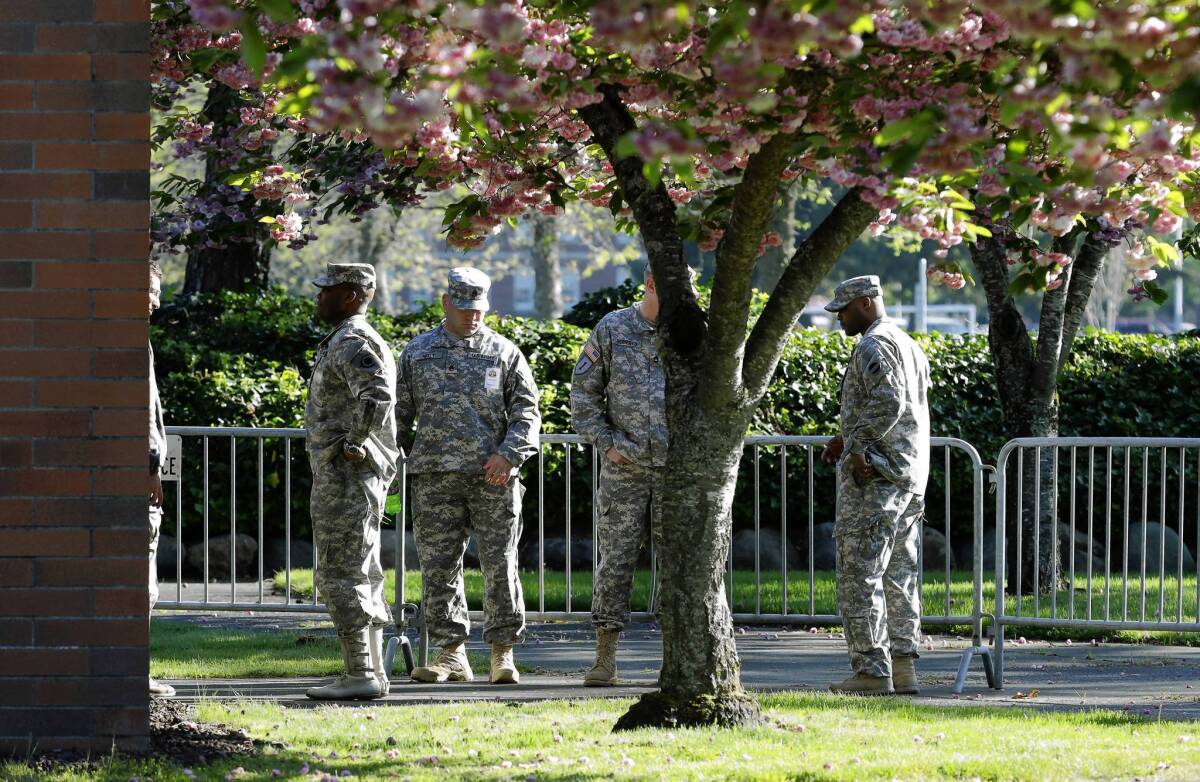Court-martial opens for sergeant who killed 5 U.S. troops in Iraq

- Share via
JOINT BASE LEWIS-McCHORD, Wash. — Army Sgt. John Russell opened fire on U.S. mental health workers at a combat stress center in Iraq out of revenge after doctors said he was not eligible to leave the Army, prosecutors said Monday at the opening of Russell’s court-martial on charges of premeditated murder.
Five U.S. servicemen were shot to death at the Camp Liberty clinic in 2009. The defense claims that Russell suffered from chronic stress and mental illness that flamed into a psychotic fury. Prosecutors said Russell had substantial time to think about his plan and then made his way through the clinic with deadly precision.
Russell has said that he was “blinded by rage,” prosecutor Lt. Col. Robert Stelle told a military judge, but “this is a case about revenge.”
Russell, 48, pleaded guilty last month to five specifications of murder, and in exchange prosecutors agreed not to seek the death penalty. The court-martial that began Monday will help determine what sentence he receives and whether he is eligible for parole.
A key question in the trial before Army Judge David Conn is whether Russell, a communications worker who was on his third deployment to Iraq, engaged in premeditation before shooting two mental health providers, two patients and a bystander at the clinic in Baghdad where he had earlier in the day been a frustrated patient.
In his account last month, Russell told the court he was taunted by psychiatrist Lt. Col. Michael Jones after threatening to kill himself. He said Jones made light of his desperation, purportedly telling him dismissively, “You’re fixed” and “You made your decision.”
In questioning a witness Monday, defense attorney James Culp emphasized that Russell had never threatened to kill anyone but himself.
But prosecutors laid out a much different version, saying Russell feared repercussions to his career after having blown up at an officer and was disappointed when he failed to get a medical exit from the Army.
In a visit to the mental health clinic on the day before the shooting, he said, Russell had a treatment session with Jones in which he talked about “workplace anxiety” and “expressed a desire for information about getting out.”
“[Jones] told him, ‘That’s not you. You’re going to be all right, Sgt. Russell,’” Stelle related.
On the day of the shooting, Russell was escorted to a second appointment with Jones by Staff Sgt. Enos Richard, who testified that Russell was inside for only a few minutes when he rushed out again, clearly angry, with Jones in pursuit.
Richard said Russell told him, “Let’s go.”
Jones and Russell began arguing, Richard testified.
“If you want to get out, this isn’t the way to do it. You need to cooperate, and we’ll get you out,” Jones told Russell, Richard said.
But Russell, Richard said, was “very upset. And he said, ‘It’s not about my …career. I could give a damn about my career.’ And he refused to go back inside.”
When military police arrived, Russell held out his hands and asked to be arrested, but instead they cleared him to return with Richard to his unit.
They had no sooner arrived, Richard said, when Russell grabbed Richard’s weapon.
“He seemed calm and concise,” he said. Russell demanded the keys to the car, threatening to shoot Richard if he refused.
Richard said he looked at Russell closely. “He had no expression. No emotions on his face,” he said. He gave him the keys.
Richard alerted military police, who began a search for Russell, suspecting he might be contemplating suicide.
Stelle said Russell drove back to the clinic and then spent several minutes smoking a cigarette out front before going inside and opening fire.
Stelle described Russell’s methodical progress through the clinic in which his first two victims were Maj. Matthew Houseal, a psychiatrist, and Navy Cmdr. Keith Springle, a clinical social worker. The shots were heard by numerous individuals who began leaping out of windows and running for the doors. Jones was one of them.
“They hear the death of Cmdr. Springle,” Stelle said. “Four shots. Not fired in a burst. But fired with care, fired with consideration, and fired not in a random manner but with a goal.”
Testimony in the case is expected to last two weeks.
More to Read
Sign up for Essential California
The most important California stories and recommendations in your inbox every morning.
You may occasionally receive promotional content from the Los Angeles Times.










